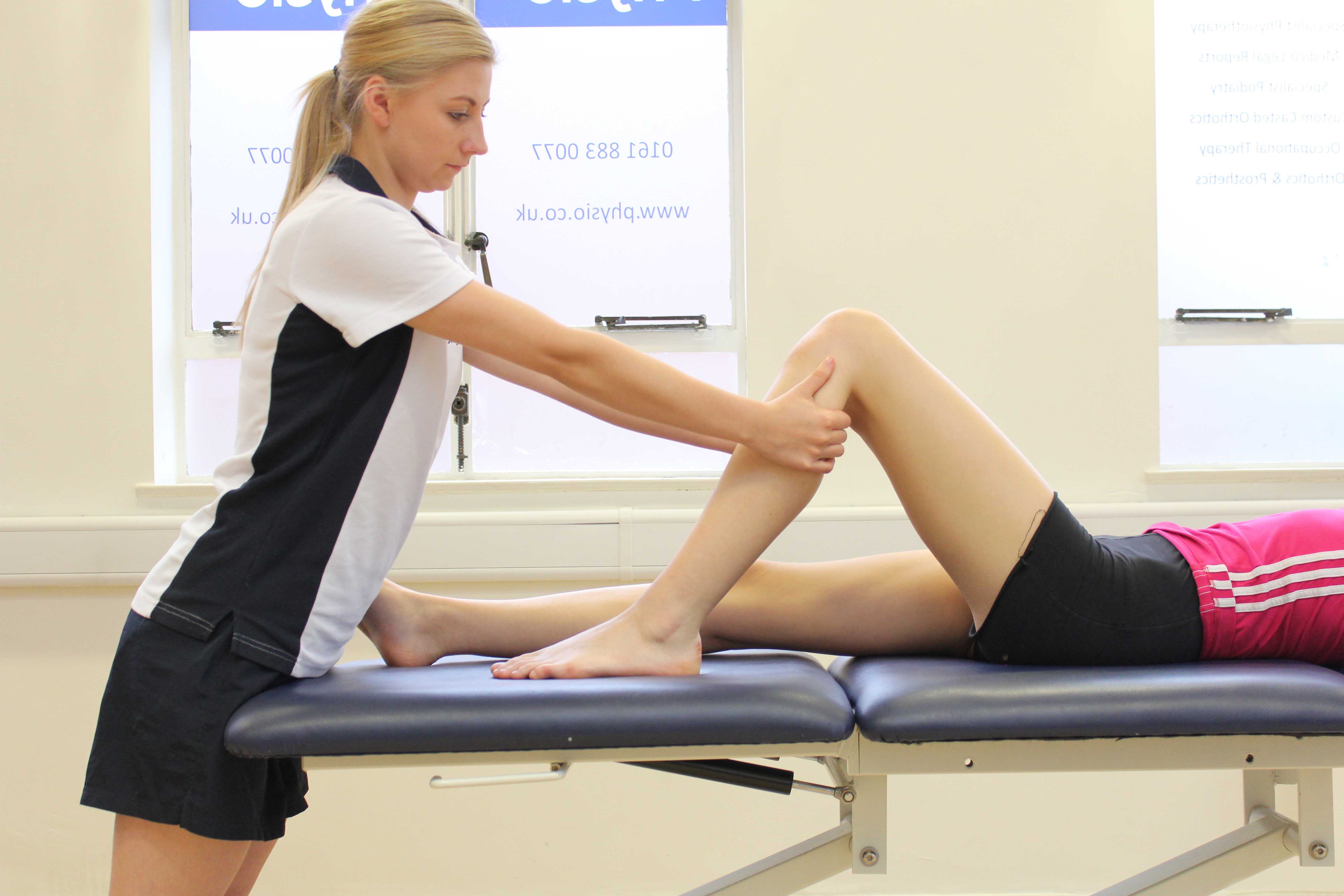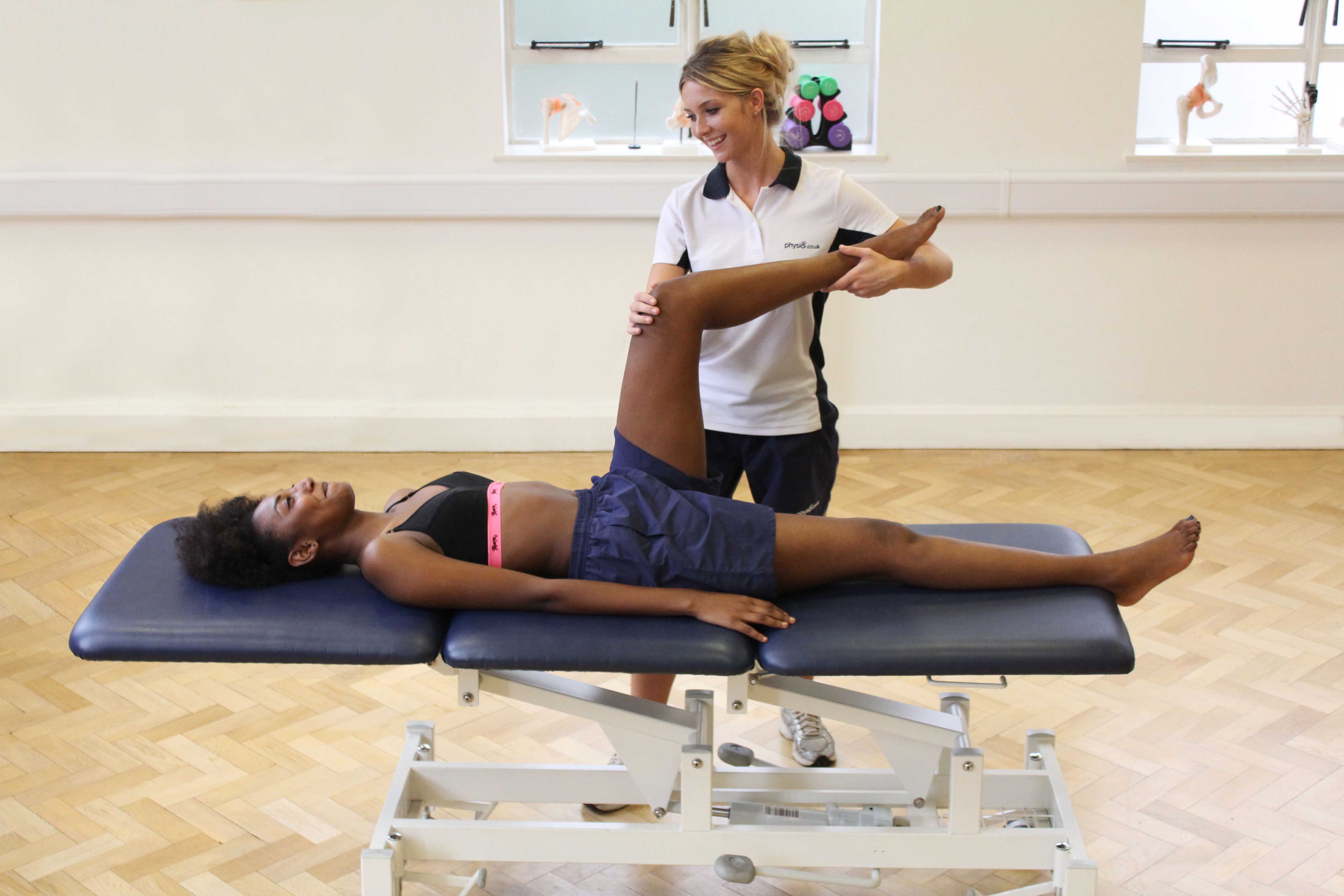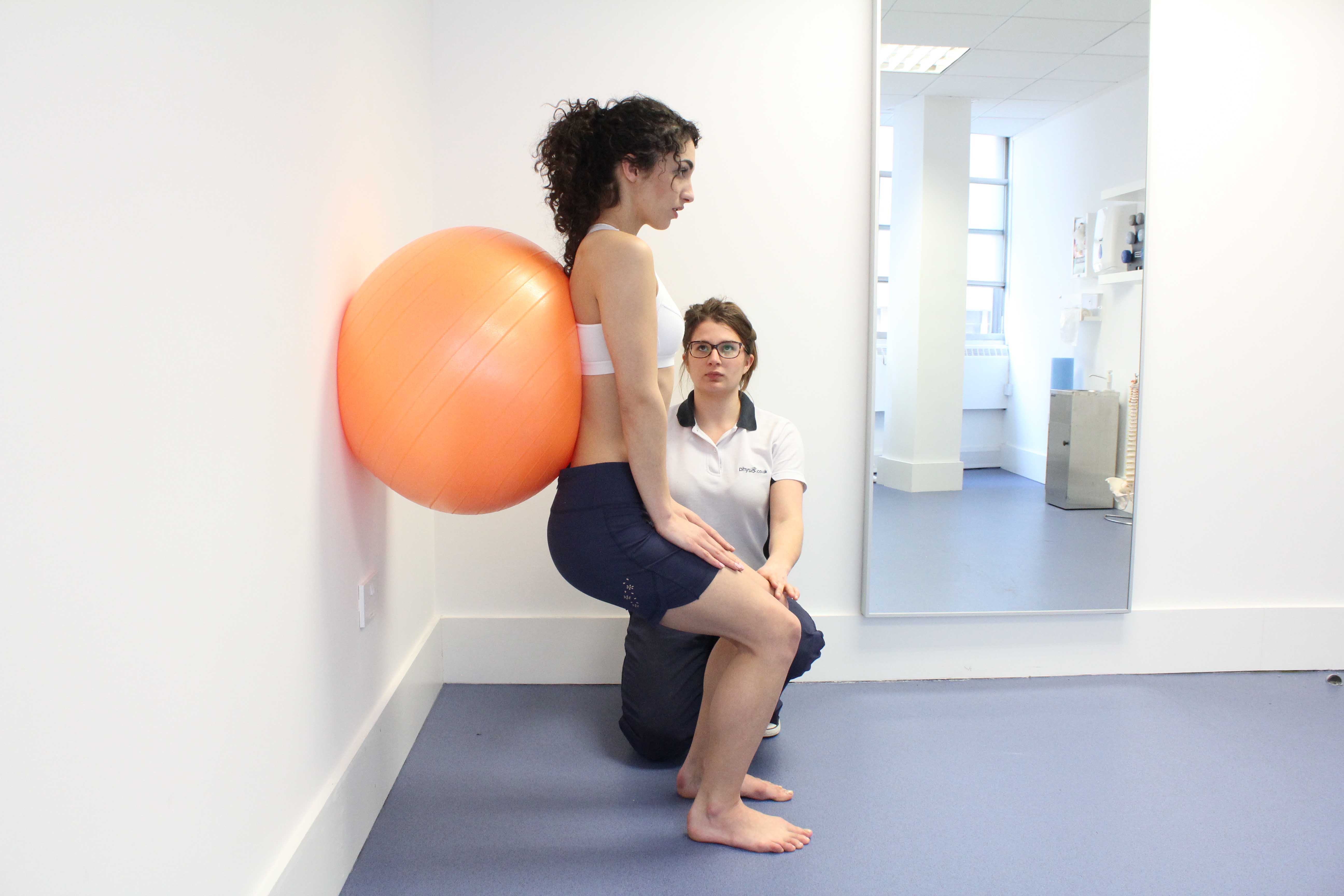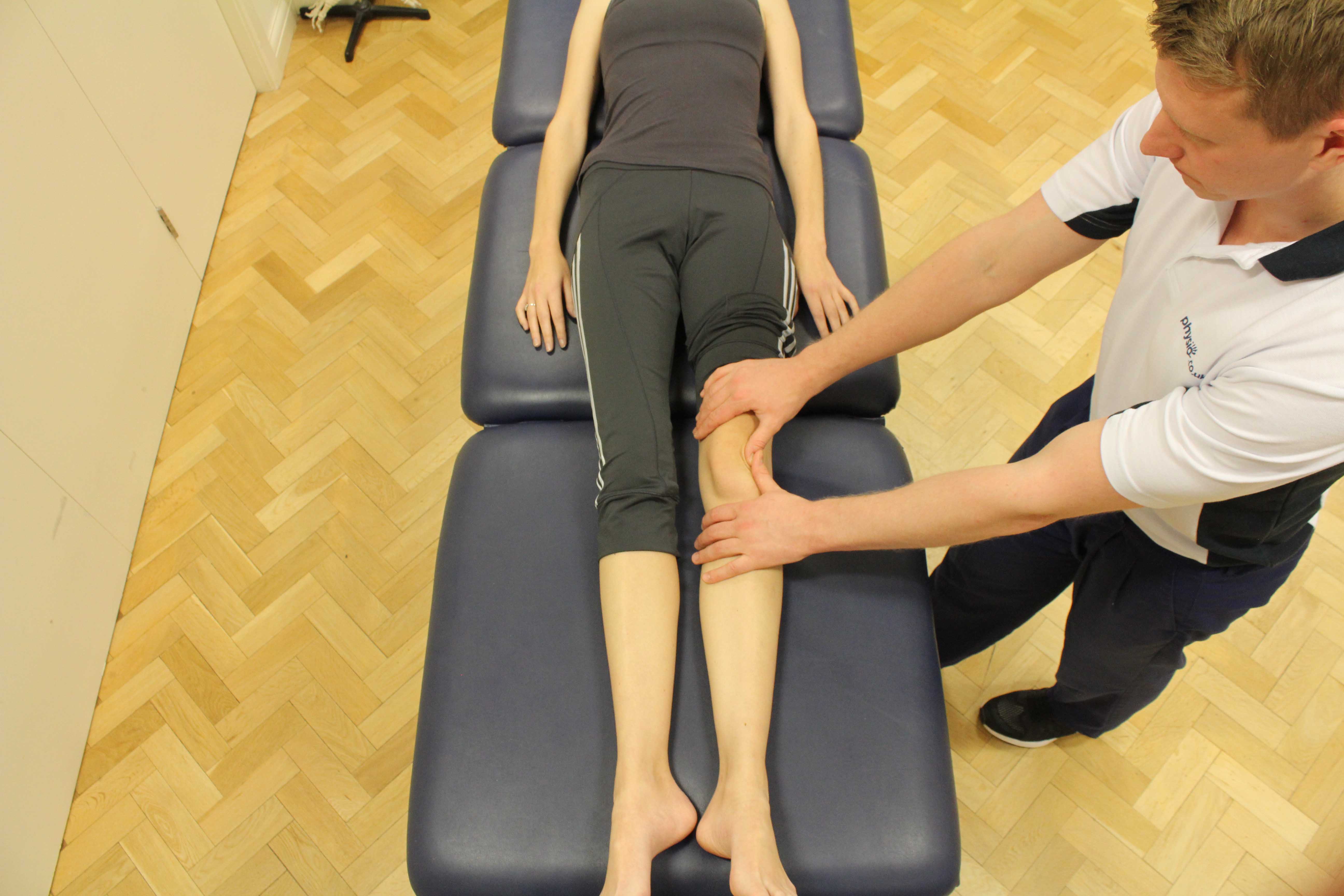The menisci are cartilage like pads that act as important shock absorbers in the knee. Meniscal tears are very common and can be surgically treated in a number of ways depending on the severity and location of the damage. After injury, the loss of this meniscal tissue can result in the risk of future arthritis and degenerative problems in the knee. When damage to a meniscus is severe, surgery may be required to remove (menisectomy) and further replace (meniscus replacement) the damaged meniscal tissues. Reconstruction of the meniscus can be achieved using an artificial scaffold. Meniscus replacement can be done via the transplantation of a matched sized allograft (donor) meniscus.
 Above: Mobilisations of the knee joint by a MSK therapist
Above: Mobilisations of the knee joint by a MSK therapistA meniscal allograft replacement is most commonly performed using arthroscopic surgery. Arthroscopic instruments are used to perform a menisectomy and remove the remaining damaged meniscal tissues. The allograft meniscus is then inserted arthroscopically and attached to the remaining original meniscal rim or joint capsule and stabilised using arthroscopic stitches.
The transplantation or the replacement of the meniscus is required following severe trauma to the meniscal tissues. Meniscus replacement/transplant is further recommended following a partial or complete menisectomy to help prevent degeneration within the knee joint and the development of arthritis. A meniscal replacement also increases the likelihood of the return of full function in the knee after a meniscal injury.
 Above: Mobilisations of the knee joint during an assessment by a MSK therapist
Above: Mobilisations of the knee joint during an assessment by a MSK therapistPhysiotherapy prior to meniscal replacement
Pre operative physiotherapy with Physio.co.uk is highly recommended before you have your meniscal reconstruction or transplant. Physio.co.uk will give you a personal physiotherapy programme that aims to better prepare your knee for your surgery. This can be done by using exercises and activities to strengthen the muscles in and around your knee as well as help support your knee by strengthening the muscles in your hip and ankle joints also. Other activities in your programme will focus on the reduction of pain and swelling and the improvement of range of motion in your knee. This preparation will further help prevent any complications and reduce your recovery time after your surgery.
 Above: Stability and strength training for the knee, supervised by a MSK Physiotherapist
Above: Stability and strength training for the knee, supervised by a MSK PhysiotherapistSymptoms post meniscal replacement
The most common symptoms you will experience after your meniscal replacement surgery is pain, stiffness and swelling in and around the knee joint. A procedure of rest, ice, compression and elevation is generally necessary and a cryocuff (cold, compression device) and knee brace is frequently provided to reduce these symptoms.
After your surgery, weight bearing may be permitted immediately as tolerated by you but in some cases elbow crutches may be prescribed for as long as required. In the initial few days following meniscal replacement it is recommended that you take it easy and keep your affected leg elevated as often as possible. You will be administered with a physiotherapy programme and assistance from Physio.co.uk immediately after your surgery. Driving is not recommended until you are comfortable and have pain free full range of motion in your knee however, you will be able to return to everyday activities within a week of your surgery.
 Above: Mobilisations of the patella by experienced MSK therapist
Above: Mobilisations of the patella by experienced MSK therapistPhysiotherapy post meniscal replacement
Physio.co.uk will now provide you with a physiotherapy programme that is unique to you and get your knee fully functioning again as soon as possible. The main aims of your physiotherapy programme with Physio.co.uk immediately after your meniscal replacement will focus on getting you weight bearing as soon as possible whilst also reducing the pain and swelling in and around your knee. Further goals will be to increase range of motion, reduce stiffness and begin strengthening the muscles of your knee joint.
0-2 weeks
Initially, you will be given a brace for up to a week. In the first few weeks you will be using elbow crutches that will help you to partially weight bear. The mains aims of rehabilitation at the point will be to increase range of motion, reduce pain, swelling and stiffness. Physiotherapy will include:
- Cryotherapy (Ice)
- Light compression wrap
- Patellar mobilisations
- Electrical muscle stimulation to quadriceps
- Quadriceps strengthening and stretching exercises
- Hamstrings strengthening and stretching exercises
- Weight bearing exercises
- Hydrotherapy
2-8 weeks
Between weeks two and eight you will be weight bearing as tolerated and you will continue to use a brace for all weight bearing activities. A brace will be required up to 6 weeks after your surgery. The goals for rehabilitation for the end of these weeks will be to get you fully weight bearing and to strengthen the muscles around your knee. Additional goals include improved range of motion and proprioception (balance).
- Cryotherapy (ice)
- Compression wrap
- Patellar mobilisations
- Electrical muscle stimulation to quadriceps
- Quadriceps and hamstrings stretching and strengthening exercises.
- Balance and proprioception activities
- Stretching and strengthening of muscles around other joints such as hip and ankle
- Hydrotherapy
- Mobility practice
- Progress to full weight bearing
8-12 weeks
During the later stages of your rehabilitation programme, Physio.co.uk will ensure that you will now be fully weight bearing, you will not be using and you will have full range of motion in your knee. Goals at this point will focus on continuing to strengthen the muscle around your knee, improving gait and improving proprioception (balance). Goals will now include improving muscle control,fitness and endurance. Rehabilitation includes:
- Continuation of exercises and treatment from previous weeks
- Quadriceps and hamstrings stretching and strengthening exercises.
- Stretching and strengthening of muscles around other joints such as hip and ankle
- Balance and proprioception activities
- Hydrotherapy
- Static bicycle activities
- Gait re-education
3-4 months
In the final part of your rehabilitation with Physio.co.uk goals will now attempt to get your knee in a pre surgery condition and focus on specific sport or functional activities. By this time you will have full weight bearing with a normalised gait pattern, you will not be required to wear a brace and you will have full, pain free range of motion. Rehabilitation includes:
- Continuation of exercises and treatment from previous weeks
- Quadriceps and hamstrings stretching and strengthening exercises.
- Balance and proprioception activities
- Hydrotherapy
- Gait re-education
- Static bicycle activities
- Agility exercises (changing direction, turning)
- Plyometrics (jumping)
- Jogging
- Sport specific activities
Summary
Following an injury to your meniscus in your knee, surgery may be required to correct the damage to your meniscus. This can be done in a number of ways depending on the severity of your injury. A meniscus replacement will reconstruct or replace your damaged meniscus. Physiotherapy with Physio.co.uk is crucial after you have had a meniscus replacement in order for you to regain full function in your knee and to return to your everyday activities, job or sport. Call Physio.co.uk now on 0330 088 7800 for more information or to book an appointment!

 0330 088 7800
0330 088 7800





































